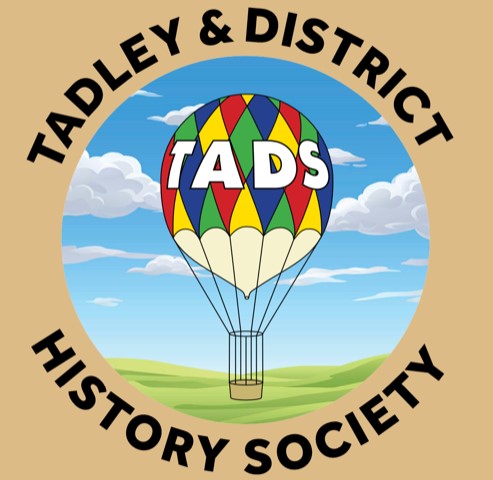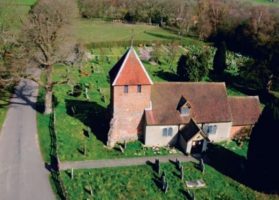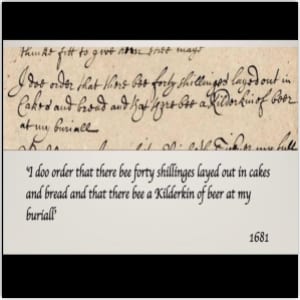A talk by Chris Broom
As the title suggests, his talk “Humour in Genealogy” uses a number of light-hearted examples to demonstrate the advantages of scrutinising original documents in family-history research, many of which contain additional information not included in online records.
Humour in Genealogy – A talk by Chris Broom
8pm April 21st, 2021
A native of Hackney, London, Chris Broom moved to Suffolk in 2013, having retired from his primary career 12 months earlier. His interest in genealogy originated with his father’s desire to find out about his family background during the last year of his life. Chris did not realise that an activity initially started as something that he could share with his father would result in five years of study with the Institute of Heraldic and Genealogical Studies in Canterbury.
The motivation for the talk came from the many years of laughter he shared with his father, watching shows such as the “Goon show”, “Morecambe and Wise”, “The two Ronnies”, “Dad’s Army” and particularly “Tommy Cooper”. Drawing information from various sources such as Parish registers, the national census, wills, diaries, journals, newspapers, and even ecclesiastical court records Chris aimed to provide some insight into the overlap between humour and genealogy research.
Parish registers were introduced on the fifth of September 1538, Thomas Cromwell, in the months before September 1538, had been on a tour of Europe where he realised that that the Europeans had already started to record births, marriages and burials. He returned to England and suggested to Henry VIII, that he should implement such registers.
In January 1813, the Act for the better regulating, and preserving of Parish and Other Registers of Births, Baptisms, Marriages and Burials in England, popularly known as ‘Rose’s Act,’ came into effect, the intention being to ‘greatly facilitate the proof of pedigrees claiming to be entitled to real or personal property and be otherwise of great public benefit and advantage.’
The early baptism records could be quite explicit. The first entry from Spilsby in Lincoln in 1813 involved Reverend Trollope baptising baby Thomas, bastard-son of Dymoke Ward (Occupation Joiner) and Liddy Day (Occupation Whore). However, the second entry on the same day involved the same minister presiding over the baptism of Lucy, bastard-daughter of John Goodrick (Occupation Publican) and the same Liddy Day (Occupation Whore).
Pronouncements by the ministers on their parishioners were common in early parish registers. One example had the comment, “Elizabeth Susan Smith, illegitimate, the father is supposed to be either her own brother or more likely the wanton preacher who was lodging in the family, the wolf in sheep’s clothing”.
Registers show that age differences did not provide a barrier to marriage, in Seasalter in Kent, in 1744. “John Housden, widower, a young, gaped-mouth, lazy fellow married Hannah Matthews, an old toothless hag.”. and in 1776, the 104-year-old George Harding, married his sprightly blushing bride, the 75-year-old Jane Darlington. George died at the age of 112.
Some marriages did overcome great disadvantages, Charity Morel, spinster, married Christopher Newsom, a bachelor. She signed a signature as Charity Morel, but Christopher Newsom simply signed with his mark. Even though she signed her own signature, Charity Morel was entirely without arms, so the ring was placed upon the fourth toe of the left foot, and she wrote her name in the register with her right foot.
Another example of overcoming adversity was the marriage of Thomas Tiles at St. Martin’s Leicester in 1575 who was mute. “The said Thomas for the expressing of his mind, instead of words, of his own accord, used these signs. First, he embraced her with his arms, and took her by the hand, put a ring upon her finger, and laid his hand upon his heart, and then upon her heart, and held up his hands towards heaven, and to show his continues to dwell with her to his life. And he did it by closing his eyes with his hands and digging out the earth with his foot, pulling as though he would ring a bell with other diverse science approved”.
Moving on to the national census, supposedly completed by an army of literate enumerators, but perhaps they were not as literate as we are led to believe. Robert Goodman, head of family in 1881 living at 16, Acacia Gardens, Paddington, in Kensington was a male aged 52, having been born in Maidstone Kent. His occupation was international playboy! Clearly the increasingly ridiculous entries, including giving the baby the occupation of “The boss” showed that our ancestors did have a sense of humour when filling in census forms. John Underwood and his family from Hastings in Sussex describes himself as bad tempered, his wife as having a long tongue, and his kids as quarrelsome, stubborn, greedy, vain, and noisy. Some strange occupations did, however, turn out to be genuine. Edwin Downer described himself as a drowner and William Parker described himself as a Knight of the Thimble.
References to pets in the census are more common than you than one might think, Peter Tabby, the cat who was described as a servant and who had an occupation as a Mouser. Another cat Tobit Crackit, a tomcat, aged eight, was married with 16 kids. He was a mouse fetcher and a thief. Wills also provide a wealth of interesting pet stories, for instance “I bequeath to my monkey, my dear and amusing Jacket, the sum of 10 pounds sterling per annum to be employed for his sole and exclusive use and benefit to my faithful dog Shock and my cat Tibbs a pension of five pounds sterling”.
Names are a rich source of humour; the daughter of Arthur Pepper was born on the 19th of December 1882. She was given a given name for every letter of the alphabet. She was called Anne, Bertha, Cecilia, Diana, Emily, Fanny, Gertrude, Harriet, Implasia, Jane, Kate, Louisa, Maud, Nora, Ophelia. Quince, Rebecca, Starkey, Teresa, Ulysses, Winifred, Xenophon, Yeti, Zeus, Later names from the early 20th century are more recognisably humourous; Morris Dance, Al Fresco, Benny Fit and even Mini Skirt.
Finally, we get to ecclesiastical court records. Mr. Baker, the printer was brought before the courts for false printing of the Bible with errors in various places. For example, in the edition of 1631. In the 20th chapter of Exodus, he printed thou shall commit adultery The Bishop of London said this was the most dishonorable thing.
Chris closed the talk by making a point of asking the audience, “What are you doing to record your own life?” You just need to capture the highlights maybe three or four sheets of A4 paper. Or you might want to devise a questionnaire to give to your kids or your relatives. What would they like to know about you? Where you went to school? What was your first job? Where was the first concert you went to? or What was your favorite book? Without wanting to sound as though he was preaching, Chris really would encourage people to record their own lives.
_____________________________
A native of Hackney, London, Chris Broom moved to Suffolk in 2013, having retired from his primary career 12 months earlier. He then spent five years studying with the Institute of Heraldic and Genealogical Studies, Canterbury, to gain professional qualifications in genealogy. Chris now runs a family-history research and education business, ‘Chance Encounters’, as well as being an active committee member of Alde Valley Suffolk Family History Group.
JOIN TADS for to learn more about Local history
Also get access to our member pages and extended history resources!
Annual subscription to the society is ₤20.00



